Agriculture and Biosecurity newsletter: April 2024
Opening piece from DCEO, Jed Matz

Good afternoon everyone
It’s hard to believe we are already one quarter of the year down and what a year it has been so far!
Over recent months our teams have been incredibly busy assisting in emergency responses - fires and floods, conducting biosecurity surveillance, supporting industry, assisting in national responses and continuing the fantastic ‘business as usual’ work that our divisions are involved in to protect our primary industries through research, surveillance and science. Our team has been resilient to the changes and I am grateful for their ongoing efforts.
In the coming weeks, we will see the new Biosecurity Legislative Amendments 2024 come in to effect, with our team working collaboratively with the Northern Territory (NT) Cattlemen’s Association to ensure all stations and farm properties are aware of the changes and supported as we transition to stronger biosecurity laws to protect Australia.
You can read some of the stories of what’s been happening across the Territory below.
Cheers
Jed Matz
DCEO Agriculture, Biosecurity, Fisheries
What’s new
Welcoming a new NTCA president

Photo credit: AAP, NTCA 40th Conference
Congratulations to the new appointed president of NT Cattlemen’s Association (NTCA), Mr Henry Burke. At the 40th annual NTCA conference, Mr Burke was announced as the new president, taking the reins from David Connolly, who completed a 3 year stint. The department will continue to work closely with the NTCA during Mr Burke’s tenure.
We are working collaboratively on a number of initiatives to grow the Territory’s beef cattle industry and strengthen our unified biosecurity protection.
Deputy chief executive Agriculture, Biosecurity and Fisheries said that he would like to thank Mr Connolly for his efforts in steering the NTCA through challenging times over the past 3 years and he welcomes the appointment of Mr Burke as the new president.”
We welcome Mr Burke to his new role and look forward to working closely with him to bolster our efforts to support industry as we strive toward a $2 billion agribusiness economy by 2030.
NT Rural Women’s Award winner 2024
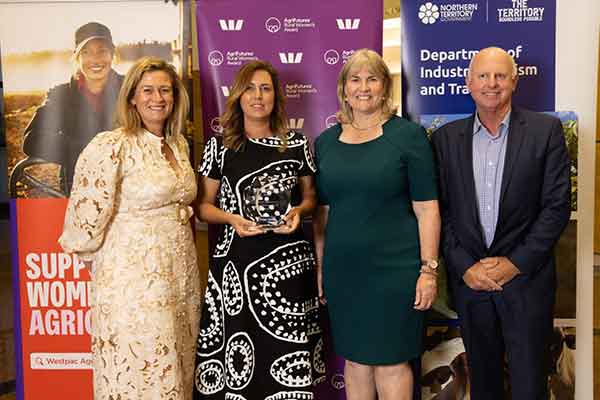
A Territorian’s innovative project that focuses on supporting Aboriginal women in remote communities to run their own op shops has seen her crowned the NT Rural Women’s Award winner for 2024.
Tanya Egerton’s project ‘The Remote Op Shop Project’ saw her win the prestigious title last week at a ceremony at Parliament House.
This year the judges had an incredibly hard challenge, with Tanya Egerton, Rayleen Brown, Rashida Khan and Rebecca Forrest each putting forward innovative projects aiming to build new remote businesses, support young people to engage on boards, provide better mental health services, and improve supply chains for bush foods.
Each of the finalists are paving the way for rural, regional and remote communities across the Territory for years to come and it is great to see submissions for this award continue to grow. The finalist will all join the NT Agrifutures Rural Women’s Award Alumni which is an impressive network of rural women innovators chaired by Donna Digby from Alice Springs.
The Rural Women’s Awards acknowledge the significant achievements of women from rural communities and industries by identifying, empowering and celebrating rural women and their forward thinking initiatives.
The Remote Op Shop project will receive a $15,000 grant from Westpac, and Tanya Egerton will represent the NT at the national awards later this year.
Indonesian animal science students learn firsthand at NT research stations
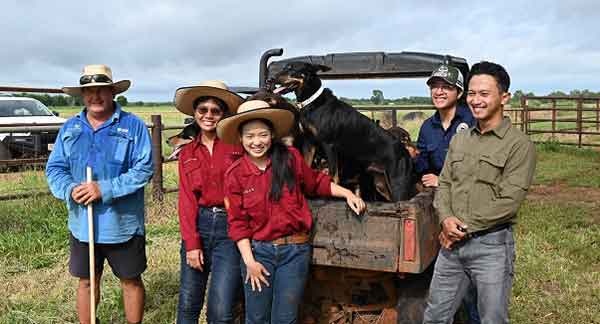
The Indonesia-Northern Territory Biosecurity Program (INTBP) is a development program for young Indonesian animal science students to build skills and relationships across industry and governments in the NT and Indonesia with a focus on improving biosecurity practices in Indonesia. Recently, 4 students from the Universitas Gadjah Mada embarked on a 4-week trip to the Territory, where they spent time learning and shadowing staff at facilities across the Territory.
Students also had the opportunity to complete training in cultural awareness, biosecurity, OH&S and animal handling and after returning to Indonesia the students will develop and implement biosecurity projects to utilise their new knowledge.
The 4 students that participated in this program visited Katherine Research Station (KRS) in mid-March and learned about how livestock biosecurity is monitored in the Top End. KRS staff treated them to a working dog demo. They also visited Eva Valley Meats and were provided with a range of hands-on learning opportunities.
During their time in the Territory, the students visited biosecurity labs, livestock research facilities, live export facilities and cattle stations. The INTBP supports our ongoing efforts to strengthen relationships with trade partners and promote best practice biosecurity management.
Special thanks to the NT Cattlemen’s Association who were our delivery partner in this program.
Cattle producers urged to vaccinate against common cattle conditions
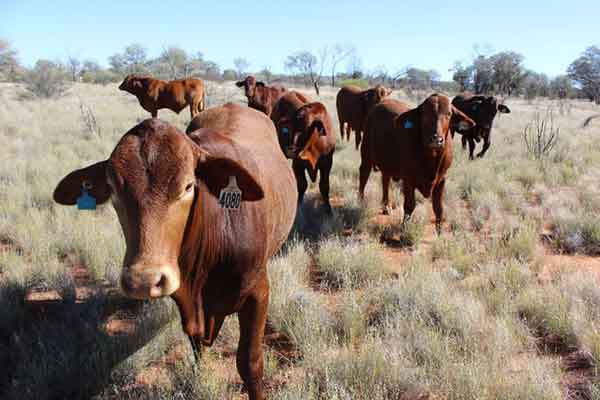
With the current very wet weather conditions in parts of the NT causing high flood levels in some areas, the NT Government’s Chief Veterinarian, Dr Rob Williams is encouraging producers to look out for cattle sickness or deaths. A range of common animal conditions are easily transmitted during a prolonged period of extreme wet weather. These include tick fever, 3‑day sickness, botulism, enterotoxaemia, pulpy kidney, coccidiosis and plant toxicities.
Symptoms that cattle producers should be on the lookout for include staggering, head turning, laying down, severe or bloody diarrhoea, bloody urine, sunken eyes, fevers, muscle tremors or depressed appetite.
Australia remains free of foot-and-mouth disease and lumpy skin disease, so testing of skin lesions or blisters supports the Territory Government to continually demonstrate to our overseas trading partners that we remain free from emergency animal diseases.
Some of the common diseases that occur during the wet season, especially in flooding events, are preventable with vaccinations. Vaccinations include botulism vaccine and 5‑in‑1 or variations such as 6‑in‑1 and 7‑in‑1 vaccines, which protect against clostridial diseases or leptospirosis. Vaccines are also available for tick fever and 3‑day sickness. Some diseases such as coccidiosis can be prevented by the use of ionophores, most commonly monensin.
Please contact your local veterinarian or local NT Government livestock veterinarian or inspector, if you are concerned about your stock.
If there is a serious, unusual condition you can also contact the Emergency Animal Disease hotline on 1800 675 888.
For further information on common diseases of concern, go to the Northern Territory Government website.
Research, development and extension updates
A field day to underscore climate resilience in the NT
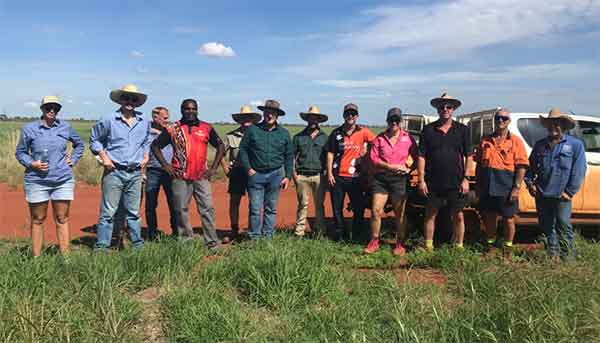
Climate change is one of the key factors reducing sustainability and profitability of Australian farms. We need climate smart agriculture with urgency to safeguard the future of our agricultural sector. To help the adoption of climate smart agricultural practices, a field day was recently held near Ti Tree as part of a project to increase climate resilience through soil improvement in the arid regions of NT. As part of the project, compost was applied at 2 demonstration sites to showcase the benefits of increased soil organic matter on water savings, soil nutrient status and yields.
Daryl Troy from Katayf farm (formerly Oolloo farm) near Ti Tree and Paul McLaughlin from Desert Farms near Ali Curung shared insights on the compost trial as a potential new practice to reduce costs and increase sustainability and profitability. John Lyne, from Peats Tropical Soil Solutions provided a display of compost-types and the field day was facilitated by the NT Government.
One key practice under climate smart agriculture, which is a win-win, is the increase in soil organic matter. Increased soil organic matter has a positive benefit on productivity in the long term by increasing soil fertility and reducing greenhouse gas emissions from the atmosphere by storing them in the soil. The compost applied at demonstration farms provided growers with first-hand information on the positive effect on soil nutrient status, soil moisture status and yield and quality of irrigated production systems. Anecdotal evidence from growers suggests that there is about a 10% increase in the yields of watermelon and pasture crops from the practice of compost application with an additional benefit of significant water savings.
Over 30 attendees at the field day were able to get first hand insights on the key farm practices and see the differences between treated and untreated water melon and pasture paddocks.
The Climate Smart Agriculture project was funded by the Northern Hub and implemented by the Department of Industry, Tourism and Trade. The field day brought together interested growers from the region, members of peak industry bodies, traditional owners and budding agriculturists, and the media. A sausage sizzle was the cherry on the cake to wrap-up the fantastic event!
An update on the National Banana Freckle Response program
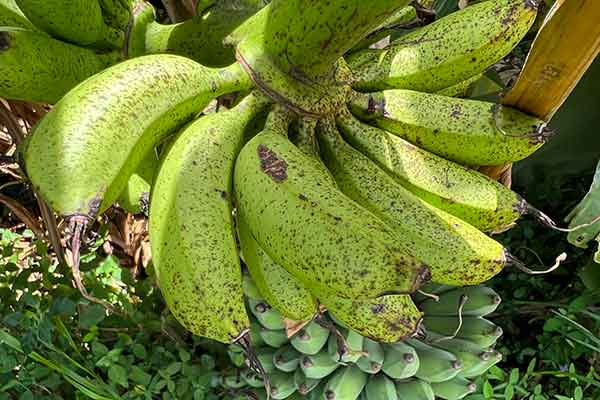
The Northern Territory continues to respond to an outbreak of Phyllosticta cavendishii (banana freckle). This fungus is exotic to Australia and affects Cavendish and non-Cavendish banana cultivars. It is a category 3 plant disease under the Emergency Plant Pest Response Deed and a declared and notifiable pest under the Northern Territory’s Plant Health Act 2008.
Banana freckle is currently contained within existing delimitation zones and no further spread of the disease outside of these rural zones has been detected over the last 4 months. Containment lines have been implemented around infected properties (IPs) and surveillance continues in the surrounding areas.
The removal of banana plants from IPs is underway with 87% of infected premises having had bananas plants removed. Where an infected banana plant is found, all banana plants from that property are removed.
The NT has had a favourable wet season for 2023-24 for the National Banana Freckle Response program. The delayed onset to the wet season meant that field crews were able to work right up to the end of 2023 with only some minor weather disruption in December 2023. The arrival of the monsoon in early January and again in February brought significant rain and flooding however, most of this rain fell south of the delimitation zones. Banana freckle is known to spread on wind driven rain and during the wet season. It can take as little 20 days to incubate and present symptoms. Surveillance on properties upwind of the containment lines to verify containment is now underway noting we are more than 60 days post first monsoonal rain and currently results for the containment of this plant pest disease seem positive.
Read more information on the national banana freckle response on the Northern Territory Government website.
2023 mango season - what has temperature got to do with it?
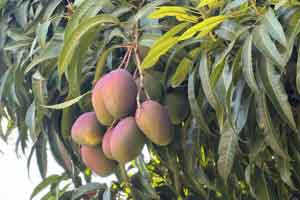
Whilst the final numbers won’t be known until the end of the Australian mango season, there is a lot of anecdotal evidence to suggest that production for the 2023 NT mango season was significantly lower than past seasons.
All plants have temperature thresholds at which specific physiological functions are optimal, sub-optimal or non-functional. This article provides a quick look at how temperature influenced the 2023 mango flowering season by modelling the daily temperatures at Tindal (sourced from the Bureau of Meteorology (BOM)) with an overlay of critical flowering temperature thresholds of mangoes. Mango varieties differ significantly in this physiological parameter; the focus of this article is on Kensington Pride (KP), a major variety in Australia on which most of the Australian mango research is based.
In terms of mango flower initiation and fruit set, there are 2 critical periods during which plant reproduction is sensitive to temperature extremes. The first is the inductive temperatures required to initiate a floral rather than a vegetative flush. The second is just prior and during anthesis when the flower buds open.
Mango flowering requires a set of ‘pre-conditions’ to be met before initiation can begin. This article will only address the temperature requirements, however there are many resources available for more information on the topic; click the links below to access them.
Generally speaking, mangoes require 5 consecutive nights with temperatures between 12°C and 18°C to initiate floral buds instead of continuing to produce vegetative ones.
The mango bud then develops into a flower over a period of roughly 25 to 30 days from bud break to the first flower opening. This is determined by heat units so it can vary from year-to-year and region-to-region. The second critical point is just before and during anthesis - when the flower bud opens. During 3 consecutive days at the pre-vacuole stage the pollen is highly sensitive to temperature. The ideal temperature for KP pollen is 15°C to 33°C. Outside that range viability drops to 60% from 33°C and 35°C and is unviable below 10°C or above 35°C.

Figure 1: The periods with critical temperature thresholds are prior to flower induction (left) and anthesis (right).
The following table outlines the daily minimum and maximum temperatures for the Tindal weather station. To provide insight into how the trees performed, the data has been colour co-ordinated to identify which periods were optimal (just right), sub-optimal (in-between) or un-viable (too hot or too cold). The time frames where the plants experienced 5 consecutive nights of inductive temperatures followed, nearly a month later, by 3 consecutive days ideal temperatures for pollen viability have been framed in pink. Any flowering initiated outside these 2 periods (10 to 16 June and 8 to 14 July) would have resulted in flowers with reduced pollen viability and 40% less fruit set.

Table 1: 2023 Tindal daily minimum and maximum temperatures, overlayed with the critical temperature thresholds for floral induction and pollen viability. The pink boxes identify periods which meet the requirements for both.
This dataset provides a starting point for the discussions regarding the sub-normal 2023 mango season. There are likely to be a number of additional factors involved behind this anomaly, beyond the higher than average temperatures.
Sources
BOM daily observations for Tindal
Issarakraisila, M., & Considine, J. A. (1994). Effects of Temperature on Pollen Viability in Mango cv. “Kensington.” Annals of Botany, 73(3), 231–240
Oosthuyse SA (1991) Stages of development of the mango panicle. South African Mango Growers’ Association Yearbook 11, 59–6.
Further information
NT DITT YouTube video on manipulating mango flower induction
HortInnovation report on manipulating mango flowering to extend harvest window
Does it matter how much grass your cattle eat?
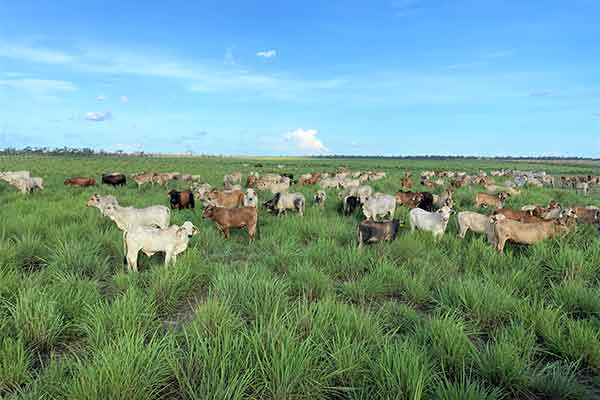
By Alison Kain, Pastoral Production Officer (Extension)
How much of your annual pasture growth can be grazed without causing a decline in land condition? For rangeland managers, knowing the safe pasture utilisation rate is the key to maintaining or improving land condition and buffering the effects of climate variability in Central Australia.
Quality Graze is a long-term grazing trial that has been running on the Old Man Plains Research Station near Alice Springs since 2010. Getting the long-term stocking rates right has allowed for significant land condition improvement while grazing a productive premium beef cattle herd. Read more on the FutureBeef website.
In 2023, researchers made an exciting breakthrough in their understanding of the effects of grazing on native pastures. Using pasture growth models in conjunction with actual field data, they have been able to determine how much pasture has grown in each year of the project and, because they have accurate stock records, they have also been able to calculate the amount of annual growth that was eaten every year. This has allowed calculation of the pasture utilisation rate over a range of seasons and therefore the average, or ‘safe’ utilisation rate, for maintaining good land condition. Utilisation rate is a significant piece of the puzzle when working out long-term carrying capacity.
The 14-year Quality Graze project has experienced very dry periods and the wettest years on record, which builds confidence that the data are representative of our variable climate. The average utilisation rate on the research station was 15% across several land types over the 14 years. The research will be used to update recommended utilisation rates for estimating carrying capacity. “This is the first time we’ve had a grazing trial in the Alice region that can inform safe utilisation rates for the local conditions and pastures,” says Dr Robyn Cowley, Senior Rangeland Scientist.
For more information on utilisation rates and carrying capacity, contact Chris Materne on 08 8951 8135 or chris.materne@nt.gov.au.
Project underway to support climate smart practices
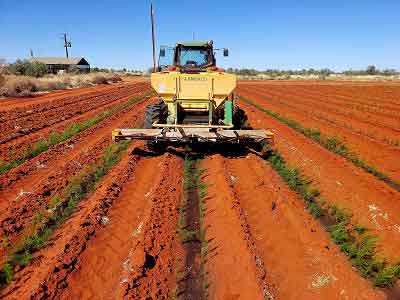
A new project to support climate smart agricultural practices across the Territory. The aim in the project is to increase adoption of climate smart agricultural practices that build climate resilience through soil improvement in the NT.
Dr Girija Page is the project lead on behalf of the Plant Industries team with the project funded by the Northern Hub.
You can watch the YouTube video’s about the work that has been conducted:
Upcoming workshops and events
Coastal Plains Research Farm 2024 field walk
Thursday 9 May 2024
The Department of Industry, Tourism and Trade invites you to join us for a field walk through the trials at Coastal Plains Research Farm to see and hear about some of the work being carried out in the Darwin region.
To find out more, email chelsea.moore@nt.gov.au.
Katherine Research Station field day
Friday 17 May 2024
The Department of Industry, Tourism and Trade invites you to join us for a field day to discuss cropping and horticulture trials taking place at Katherine Research Station.
To find out more, email mook.crothers@nt.gov.au.
Barkly paddock walk
Friday 24 May 2024
The Department of Industry, Tourism and Trade invites you to join us for a Rain Ready Rangelands project update, an overview of research and an update on the seasonal outlook.
To find out more, email jaidyn.eastaughffe@nt.gov.au.
Give feedback about this page.
Share this page:
URL copied!